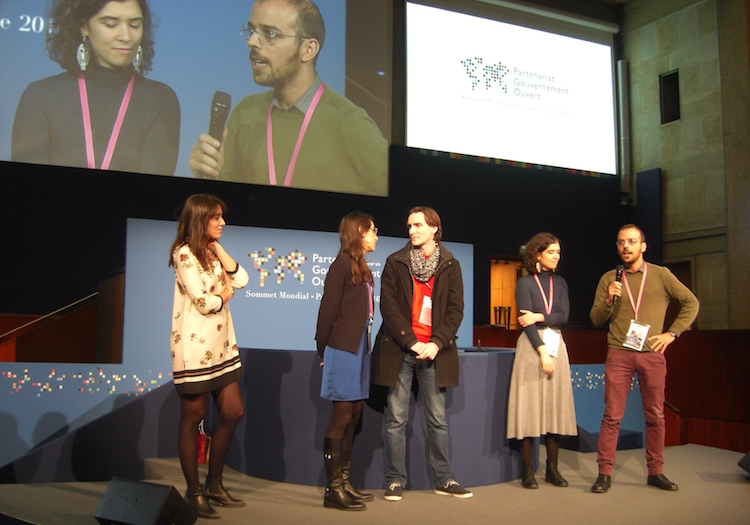By A.D. McKenzie
PARIS (IDN) – If you have always suspected that politicians around the world tend to belong to certain cliques and to have attended particular schools, there is now a digital tool being developed to confirm (or deny) your suspicions.
Called ‘Cargografías’, this was one of the many data instruments presented at the Open Government Partnership (OGP) Global Summit that took place in Paris from December 7 to 9 and brought together government and civil society representatives working for greater transparency in the public interest.
“The idea is that citizens have the right to know about public officials,” said Pablo Pignolo, a Uruguayan software analyst and developer who works on Cargografías with colleagues from other Latin American countries.
At the OGP, his team joined Malaysian and French specialists to participate in the Global Summit’s Hackathon, comprising dozens of events that focused on using data and online platforms to provide greater transparency and accountability in government.
Their project highlighted South-South as well as North-South cooperation at the summit – the fourth such gathering since the OGP was formally launched on September 20, 2011, on the sidelines of a United Nations General Assembly meeting.
While some French NGOs stayed away from the meeting to protest what they say are infringements of rights in France’s continuing state of emergency following recent terrorist attacks, other groups from across the world took part in some 600 workshops and panels, and launched a range of programmes aimed also at fighting corruption.
With the Cargografías platform, computer users can type in the names of politicians and see the schools they attended, their family’s political history, the company boards on which they sit, and other information. They can perform cross-checks to see the links between public figures.
“It becomes clear that in some countries, the political class all went to the same schools. And you can see who benefits from nepotism in that their father and grandfather might have been in politics as well,” Pignolo said in an interview.
Having access to such information will ostensibly allow voters to be more informed and to judge the veracity of claims that politicians make, said the Cargografías team, which includes journalists as well as program developers.
Meanwhile, as Cargografías and other projects in the OGP’s Hackathon highlighted the scope for using data, the summit drew up its Paris Declaration, through which 80 governments and hundreds of civil society organisations signed up to 19 “collective actions”.
These actions include transparency and open contracts in the natural resource sector, transparency on lobbying, ending abuse of anonymous companies, implementation of access to information laws, harnessing the data revolution for sustainable development and climate risk resilience, implementation of guiding principles for open data policies and increasing responsiveness of public services, said the OGP.
The Partnership also launched a ‘Subnational Pilot Program’, comprising 15 members which were hosted by Paris mayor Anne Hidalgo and which represented local government and civil society from cities including Jalisco, Mexico, and Ontario, Canada.
“A small democratic revolution is under way,” said Hidalgo. “The [OGP’s] mission is both necessary and urgent at a time when a growing number of citizens doubt or despair of elected officials’ capability to understand their aspirations and to translate them into tangible progress.”
She said that the participation of local governments in the OGP meant that cities could “make their voices heard” and work together to implement projects to move open government forward.
“This is a historic achievement that demonstrates how indispensable city participation is in overcoming the challenges of our century,” Hidalgo stated, adding that this had been “proven” with of the ‘Summit of 1000 Mayors‘ that she co-hosted with former New York mayor Michael Bloomberg during 2015 Climate Change Conference (COP 21) in the French capital.
European cities such as Paris and London are often at the centre of scandals about money laundering and tax evasion. The OGP summit saw new research, for instance, suggesting that 91 percent of London property owned by overseas companies had been bought “through secrecy havens” such as those named in Panama Papers leaked documents.
Titled “London property: A top destination for money launderers”, the research by Transparency International UK and Thomson Reuters found that there was “no data available on the real owners of more than half of the 44,022 land titles owned by overseas companies, whilst nine out of ten of these properties were bought via secrecy jurisdictions”, according to Reuters.
The dearth of data means that it is hard to trace links between such companies and people with political influence, a clear area where lack of transparency can lead to corruption, suggest the researchers.
Along with such reports, the summit also saw civil society calling for mandatory public country-by-country reporting of financial details for large multinational companies.
Some NGOs argue that this requirement would assist the authorities in developing countries to collect billions of dollars in taxes due, and that it would allow citizens to “hold their governments to account” because of the greater fiscal transparency.
Ironically, a day before the OGP summit ended, the French Constitutional Council rejected a resolution on mandatory public country-by-country reporting, seen as a key tenet in fighting against tax evasion.
Several NGOs, such as Oxfam, slammed the Council’s decision, but cynics might be tempted to say it is a ruling that anyone using the Cargografías app could have expected – because inputting the names of public leaders and corporate titans would quickly show the ties that bind, not only in France but in other countries as well.
(The writer was a moderator on a panel at the OGP summit that included civil society and business representatives.) [IDN-InDepthNews – 13 December 2016]
IDN is flagship agency of the International Press Syndicate.
Photo: Presenting projects at OGP. Credit: A.D. McKenzie

